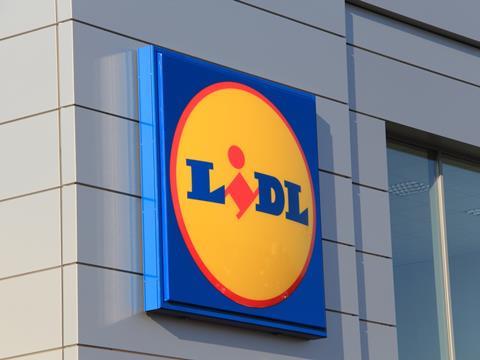
Schwarz Group, the multinational retail group operating Lidl and Kaufland, has set a new target to use 30% less plastic in its private label packaging across divisions by 2030.
In the 2022 fiscal year – compared to baseline year 2017 – Lidl and Kaufland reduced their plastic usage for private label packaging by 28% in all thirty-two countries in which they operate. An average of 17% recycled material is currently being used in plastic private label packaging for Lidl and Kaufland across countries, Schwarz Group explains.
Kaufland cut down on 31% of plastic use, and Lidl by 29%, in their German operations – utilizing 34% and 27% recycled plastic, respectively. In Germany, Lidl has achieved 56% recyclability for its private label packaging so far, and Kaufland has achieved 51%.
Schwarz Group attributes this to designing its packaging for recyclability, involving a transition into mono-materials for a large portion of its private label packaging for reuse in the same material flow. Lidl’s Metzgerfrisch, or fresh chicken, has been packaged in recycled material sourced from recycling bins and bags – having undergone rinsing, sorting, and processing to adhere to food safety requirements.
Furthermore, the amount of recycled material used in laundry, cleaning, and household products has been increased, including Formil colour laundry detergent and K-Classic toilet cleaner. Schwarz Group is still working with environmental service provider PreZero in an effort to keep increasing its use of recycled materials.
Steps taken to reduce the weight of each private-label pack include cutting down on packaging material and removing the closing clip for K-Bio Vitalgebäck organic cookies at Kaufland; removing the handle of Lidl’s Milbona Greek cream yoghurt; and rolling out new vacuum packaging.
Each of these measures are set to contribute towards the joint group-wide REset Plastic strategy. Its original goal of using 20% less plastic across countries by 2025 has already been surpassed, the company says, and has been replaced with targets to use 30% less plastic in its private label packaging across divisions by 2025 and 35% less by 2027.
Michael Janzer, director of Corporate Social Responsibility Purchasing International at Lidl, talked us through Lidl’s sustainability strategy, which includes implementing 25% recyclate in its own-brand packaging by 2025 under its vision of “Less plastic – closed loops”.
Prevented Ocean Plastic, or recovered ‘ocean-bound’ plastic waste, has been implemented into its sparkling water packaging with the aim of keeping almost 4 million plastic water bottles out of the oceans annually.
In the UK, it now offers its own-brand tea bags in ‘fully compostable’, plant-based PLA packaging in an effort to keep 800 million tea bags out of landfill every year.
If you liked this article, you might also enjoy:
The L’Oréal approach to packaging sustainability
What steps is Apple taking to make its packaging more sustainable?
How did Brazil achieve its 100% aluminium can recycling rate – and can it be replicated in the EU?
Experts have their say on the EU’s Packaging and Packaging Waste Directive revisions
Also, if you’re interested in packaging sustainability, you will want to attend our Sustainable Packaging Summit in Amsterdam on 14-15 November. The Summit brings together leaders and pioneers from across the industry to align strategically, learn, network, and create a critical mass to accelerate change. You can learn more by clicking here, and you can buy a ticket to attend here.













No comments yet